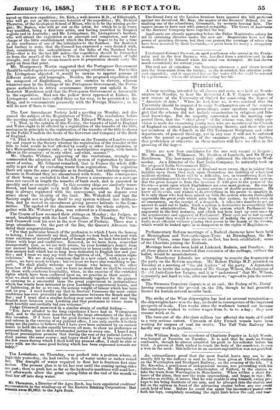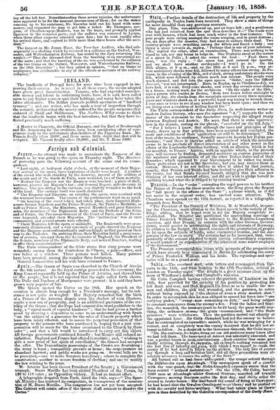Trattiurial.
A large meeting, attended by all classes and sects, was held at South- ampton on Monday, to hear the Reverend J. E. T. Rogers explain the new statute of the University of Oxford for conferring the degree of "Associate of Arts." When he had done so, it was resolved that the University should be requested to make Southampton one of the centres of examination. During the proceedings, some speakers expressed re- gret that the scheme did not include examination in religious and Bib- lical knowledge. But the majority contended, and the meeting sup- ported them, that the "chief glory" of the scheme was, that while pro- vision is made for examining young men who are members of the Church of England on certain questions appertaining thereto, and those who are not members of the Church in the Old Testament Scriptures and other departments of general theology, yet in any case it will not be enforced where the parent or guardian of the examinee objects ; and, further, that proficiency or otherwise in these matters will have no effect in the granting of the degree. A large meeting, attended by all classes and sects, was held at South- ampton on Monday, to hear the Reverend J. E. T. Rogers explain the new statute of the University of Oxford for conferring the degree of "Associate of Arts." When he had done so, it was resolved that the University should be requested to make Southampton one of the centres of examination. During the proceedings, some speakers expressed re- gret that the scheme did not include examination in religious and Bib- lical knowledge. But the majority contended, and the meeting sup- ported them, that the "chief glory" of the scheme was, that while pro- vision is made for examining young men who are members of the Church of England on certain questions appertaining thereto, and those who are not members of the Church in the Old Testament Scriptures and other departments of general theology, yet in any case it will not be enforced where the parent or guardian of the examinee objects ; and, further, that proficiency or otherwise in these matters will have no effect in the granting of the degree.
There are now four candidates for the one seat vacant at Reigate; Mr. Monson, Mr. Wilkinson, Mr. Doulton of Lambeth, and Sir Henry Rawlinson. The last-named candidate addressed the electors on Wed- nesday. As a Director of the East India Company, he naturally took up the proposed India Government Bill— He doubted if the tax-payers of England were aware' that in taking that liability upon them they took upon themselves the liability of a hundred millions sterling. There will be a difficulty, too, in transferring East In- dian establishments to the Crown, because they are on a different system. But the great danger is from the increase it will give to the power of the Crown—a point upon which Englishmen are ever most jealous. He was
no means an advocate for the present system of double government. Es knew all its evils, and wished to do everything in his power to simplify it. It is only those who had been mixed up with the system who con thoroughly appreciate the great evils which arise from that system, by which even in an emergency, on the receipt of a despatch, it takes two months to get an answer to send out to India. Such a system is destructive to everything like vigour in administration. But that is the system which Parliament in- augurated in the first instance, and which has been kept up ever since by the acquiescence and approval of Parliament. Their eyes are at last opened, and he hoped they would devise some means of making the government of India more efficient without placing that power in the hands of the Crown, which would be looked upon as so dangerous to the rights of Englishmen.
Parliamentary Reform meetings of a Radical character have been held at Birmingham and Newcastle-upon-Tyne. At Birmingham, the Re- formers' Union some time since set on foot, has been established ; some of the Chartists joining the Radicals.
Meetings have also been held at Liakeard, Bodmin, and Penrhyn. At all these places it was resolved that extension of the suffrage, without the ballot, would be unsatisfactory.
The Manchester Liberals are attempting to reunite the fragments of the party on the Reform question. Mr. Robert Philips M.P. presided on Tuesday at a meeting of ` the old leaders" of the party. A deputation
• yes sent to invite the cooperation of Mr. George Wilson, the chairman of the old Anti-Corn-law League and it is "understood" that Mr. Wilson, apparentlysiiitibard to win, after one interview, "agreed to join the move-
-• '• The Swansea Cemeteryllisputeis at an end ; the Bishop of St. David' having consecrated the ground on -the 7th, though he had granted a licence for burials several months back.
The strike of the Wear shipwrights has had an unusual termination— the shipwrights have won the day, no doubt in consequence of the improved prospects of trade. Five weeks since the workmen turned out because the employers wished to reduce wages from 68. to 4s. a day ; they now resume work at 5s. • , The turn-out of the Aberdare colliers has affected the trade of Cardiff to a very serious extent. Upwards of fifty French vessels have been waiting for cargoes of cool. for ,weeks. The Taff Vale Railway lias hardly any work to perform. • ' •
John William Beale, the murderer of Charlotte Pugsley in Leigh Woods, was hanged at Taunton on Tuesday. It is said that he made no formal confession, though he almost admitted his guilt to his solicitor before his trial. A person at Bath wished to touch the body of the murderer, to cure a wen in the neck : this believer in an ancient superstition was notgratified.
An extraordinary proof that the most fearful hurts may not be in- stoutly felt by the sufferer is said to have been given at Thelwall station on the Warrington and Stockport Railway, on the evening of the 4th. "A Mr. Knowles, a gentleman of independent means, was proceeding with his father-in-law, Mr. Hampson schoolmaster, of Salford, to- the btation to take the train from Warrington to Manchester. When within a short dis- tance of the place, they saw the train approaching, and began to run ; Mr. Knowles so swiftly, it seems, that he was unable to stop himself, owing Per- haps to his being destitute of one arm, and he plunged into the station and fell on the railway in front of the advancing engine before any one could catch hold of him. Before he could rise again the locomotive pamed over both his legs, completely smashing the right limb below the calf, and tear-
beg off the left foot. Notwithstanding these severe injuries, the unfortunate snan appeared to be for the moment =conscious of them ; for. on the stoker eunning up to his assistanee, Mr. Knowles held out his hand with some money, and requested the man to get him a ticket. Mr. Thompson, sur- geon, of Chorlton-upon-Medlock, was in the train, and promptly applied ligatures to the wounded parts; and the sufferer was removed to Lymm, whim three other surgeons attended upon him ; but he sank rapidly after his arrival there, and expired in little more than three hours after the acci- dent."
' The inquest on Mr. James Hunt, the Poor-law Auditor, who died gab- sequently to a shaking which he received in a collision on the Oxford, Wor- cester, and Wolverhampton Railway, has ended by the Jury returning this verdict—" That the deceased died from the bursting of an aneurismal sac of the aorta ; and that the bursting of the sac was accelerated by the collision of the two trains on the Oxford, Worcester, and Wolverhamptou Railway, on the 18th December"; but they added an opinion, "that no blame or negligence was attributable to any of the officers or servants of the railway company."



























 Previous page
Previous page